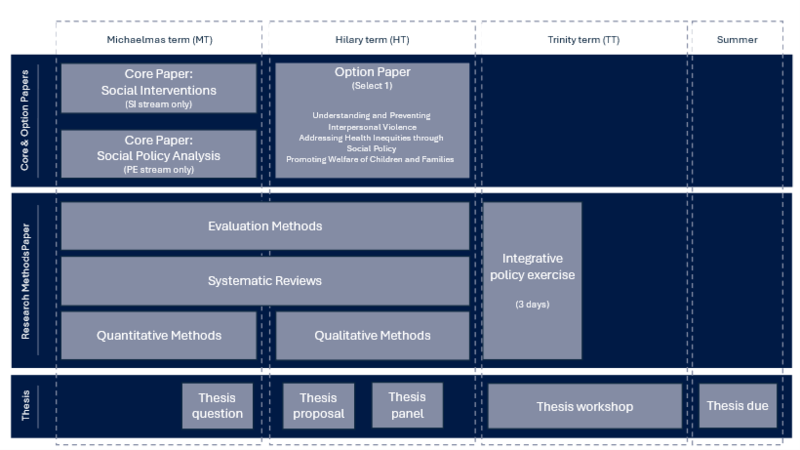Evidence-Based Social Intervention and Policy Evaluation Master's Programmes

We offer two Master's courses in Evidence-Based Social Intervention and Policy Evaluation (EBSIPE):
All societies face complex social challenges, prompting the development of policies and interventions aimed at improving health, education, and wellbeing, addressing structural inequalities and promoting social justice. The MSc and MPhil in EBSIPE are designed to provide high-quality graduate level research training in concepts and methods for evaluating social interventions and policies.
Rigorous methods training
Our papers emphasise research and evaluation methods (quantitative, qualitative, randomised trials, advanced quasi-experimental methods) for social scientists, systematic reviews and critical appraisal of evidence, intervention development and adaptation, as well as the advanced study of evidence-based policy and practice.
Evidence for policies and programmes
Our courses have an interdisciplinary and international perspective focusing on appraising, generating and using evidence in policy and practice with an emphasis on ethics and equity. Key areas of focus include poverty reduction, child and family services, education, violence and injury prevention, mental health, substance use, HIV prevention and other social issues.
Deadline for applications
Tuesday 27 January 2026, 12:00 midday UK time.
Structure of the courses

In Michaelmas Term (October – December):
Core papers: 1 Module (different for Social Intervention and Policy Evaluation students)
-
Social Interventions (SI stream)
-
Social Policy Analysis (PE stream)
Research Methods papers: Modules are the same for SI and PE students.
-
Evaluation Methods
-
Systematic Reviews
-
Quantitative Analysis
Exams and Research:
-
Methods Assignments
In Hilary Term (January – April):
Research Methods papers: Modules are the same for SI and PE students.
-
Evaluation Methods
-
Systematic reviews
-
Qualitative Methods
Options Papers: 1 Module chosen by student (Example options below, subject to change)
-
Welfare of children and families
-
Community analysis and large-scale interventions
-
Health: policy and Inequalities
Exams and Research:
-
Methods Assignments
In Trinity Term (May – August):
Core Papers: Policy Exercise (both streams)
Research Methods papers: Modules are the same for SI and PE students.
-
Evaluation Methods
-
Systematic reviews
-
Advanced Methods (optional/offers vary)
Exams and Research:
-
Exams/Assessments (Core/Option)
-
MSc Thesis
Students on the two-year MPhil will have a further option course, and research thesis submitted in the second year.
On the EBSIPE course, you can focus on the evaluation of micro-level social interventions or macro-level social policies. These represent two distinct pathways structured around a shared core.
The shared courses comprise classes on research design, statistics, qualitative analysis, systematic reviewing and critical appraisal. The courses prepare you to be critical consumers of research, and to design and implement your own research projects. You cover key research designs, as well as quantitative and qualitative techniques for measuring process and outcome. There is a particular emphasis on appraisal and design of randomised controlled trials, quasi-experimental designs and systematic reviews, and their application to social interventions and policy evaluation.
In addition to the common courses, you will select (after a trial week in Term 1) from the following two pathways:
-
The Social Intervention pathway covers theories underlying interventions (such as changes to alcohol trading hours or parenting training); conceptual foundations of evidence-based practice, and the science behind development, cultural adaptation, testing, and implementation of social interventions in the real world. You are taught through lectures, practicals and case studies of interventions for different social problems, led by experts in these applications.
-
The Policy Evaluation pathway introduces you to evidence-based social policy analysis. Policy analysis examines the process of policy-making, the setting of objectives, the choice and design of policy, and the mechanisms of implementation.
You will take specialist courses (one in the MSc or two in the MPhil) from a list of options focusing on a particular policy area, vulnerable group or analytical approach. Past options covered topics such as children and families, community analysis and intervention, health inequalities and social policy.
Teaching in some options may not be available every year.
On both pathways, you will write a thesis on a topic of your choice, agreed with your supervisor. Assessment is based on a combination of examinations and/or submitted coursework assignments throughout the year.
Supervisor
You are allocated a supervisor in the department, who provides academic guidance oversees your progress. Other departmental staff are also available to provide guidance, including staff leading lectures and classes, the Director of Graduate Studies, and the DSPI administrative team.
College Tutor
You are also allocated a college tutor who is responsible for your general welfare and who can provide guidance on any challenges on the academic or social side.
In addition, you can draw on University-wide support as needed, such as Women’s Advisors and Chaplains in colleges and ultimately to the Head of the College. The University has a counselling service which provides advice, both immediate and long term, to students in need. There are college nurses and all colleges have a college doctor and many a college dentist.
Course Director
Your programme will be led by a Course Director, working with a close-knit team of teachers and supervisors. The Course Director takes overall responsibility for co-ordinating teaching, arranging specialist supervision for option papers and thesis writing.
Profiles of current students can be found here and you can take a look at our student videos. Graduates from our programme go on to pursue academic careers in world-leading research universities, while other alumni hold influential positions in government, non-governmental and international organisations such as the World Bank, the World Health Organisation, and the UN.
Oxford 1+1 MBA Programme
The Oxford 1+1 MBA programme provides high calibre candidates with the opportunity to apply to both the Comparative Social Policy MSc programme and the MBA programme offered by the Saïd Business School.
ESRC 1+3.5 Doctoral Training
These programmes can be part of a 1+3.5 ESRC University Doctoral Training Centre scholarship. Find out more on the doctoral training site.
TrygFonden Scholarship
The TrygFonden Scholarship is available for students resident in Denmark studying the MSc in Evidence-Based Social Intervention and Policy Evaluation. Find out more here.
Some funding is available through the University of Oxford (see below) but you are strongly encouraged to apply for non-Oxford funding sources. You should consider funding for their studies as early as possible.
A guide to the fees and funding can be found here: http://www.ox.ac.uk/admissions/graduate/fees-and-funding
|
University of Oxford scholarships Applications received by the funding deadline for your course will be automatically considered for a number of scholarships available through the university, its colleges and other funds managed by both. The range of scholarships and eligibility criteria can be found here. |
External scholarships Given the strong competition for funding applicants are strongly encouraged to also seek out scholarships offered by non-University of Oxford bodies. A list of outside funders linked with the University of Oxford can be found here.
|
To find detailed information about the application process, including deadlines and required documents, please visit:
- MSc in Evidence-Based Social Intervention and Policy Evaluation
- MPhil in Evidence-Based Social Intervention and Policy Evaluation
For general advice on applying to graduate courses, visit the University of Oxford Graduate Admissions page.
For specific questions or to hear more about the department, academic staff and our application procedure, please contact our admissions officer: admissions@spi.ox.ac.uk
Further Information
The Master’s programmes in EBSIPE are designed to provide you with high quality graduate level research training in the concepts and methods used to evaluate social interventions and policies. We emphasise research methods for evaluating interventions and policies, as well as the advanced study of evidence-based policy and practice. This could be in areas such as poverty reduction, child and family services, education, violence and injury prevention, mental health, refugees, drug and alcohol abuse, and HIV prevention.
The core aim of the course is to help you develop the ability to design and critically appraise intervention and policy evaluation studies. It also enables you to apply your research findings to informing policy and practice.
The aims of the course are for students to:
- Develop critical appraisal, problem solving and research methods skills in the field of evidence-based interventions and policies for social problems.
- Critically assess and evaluate the political, economic, social, and policy factors that shape social problems and social inequalities
- Learn how to develop, analyse, and evaluate social interventions and develop awareness of key conceptual and methodological issues in intervention research.
- Understand the ways in which research findings concerning evidence-based interventions and policies can be transferred into practice and the challenges and possibilities associated with transferability.
- Apply the skills necessary for carrying out further research in this field, and where applicable, to progress as leading practitioners or senior managers in agencies for social intervention, policy makers, policy analysts, and policy and programme evaluators.
|
Course element |
MSc |
MPhil |
|---|---|---|
|
Research methods taught via classes, seminars and workshops: - Evaluation methods - Quantitative methods - Qualitative methods - Systematic reviews |
Examined through three assignments |
Examined through three assignments |
|
Streams: Evidence-Based Social Intervention or Policy Evaluation taught via a series of lectures and classes. |
Examined through a written exam and/or assessment |
Examined through a written exam and/or assessment |
|
Option papers provide the opportunity to explore a particular policy area, vulnerable group or analytical approach. |
One option taken, examined through assessment |
Two options taken, examined through assessment |
|
Thesis on a topic of your own choice and agreed with your supervisor |
Design and write a 10,000 word thesis |
Design and write a 30,000 word thesis |
The central paper for both streams of the EBSIPE programme is the Research Methods (RM) paper. This trains you to be good consumers and producers of research on evaluation of social policy and interventions. It includes a range of experimental designs, research synthesis, statistical analysis and qualitative methods. There is a particular emphasis on appraisal and design of randomised controlled trials, quasi-random experimentation and systematic reviews, and their application to social interventions and policy evaluation.
The RM paper includes four different (but related) modules:
-
Evaluation Methods – a two-term module about the design, analysis and appraisal of evidence-based evaluation, that runs through Michaelmas and Hilary terms, with a compulsory group exercise held in Trinity term.
-
Systematic Reviews – a two-term module covering both quantitative, qualitative, and mixed-method systematic reviewing.
-
Quantitative Analysis using R– a one-term module that runs in Michaelmas term, with weekly applied seminars and a set of lectures.
-
Qualitative Methods – a short one-term module that runs in Hilary term.
Your RM paper is examined through three RM assignments, submitted throughout the academic year. Each assignment assesses a different aspect of the topics covered across the paper’s modules. You typically have several weeks between receiving the assignment instructions and the deadline to submit your work.
There are two distinct pathways structured around a shared core. You can focus on the evaluation of micro-level social interventions on the Evidence-Based Intervention pathway or macro-level social policies on the Policy Evaluation pathway.
Social Intervention
This pathway examines major theories underlying social interventions. It uses exemplary intervention research studies to illustrate important theoretical, ethical, methodological and practice issues. Topics include critical examination of:
-
the ethics of intervening and of researching with vulnerable groups;
-
the cultural factors in intervention research;
-
theoretical approaches to intervention including ecological, cognitive-behavioural and developmental;
-
the application of evidence-based approaches in practice using exemplary research studies (for example, combining quantitative and qualitative methods in large cohort studies to inform mental health practice; community-based randomised controlled trials; practitioner evaluation studies);
-
the dissemination and transportability of research into policy and practice and across cultures;
-
the limitations of evidence-based practice.
The paper is taught in the first term through lectures, seminars and tutorials.
You will write two formative (not included in final mark) essays for discussion with your supervisor in tutorials, as well as prepare class presentations.
Policy Evaluation
This course introduces you to social policy analysis. Policy analysis examines the process of policy making, the setting of objectives, the choice and design of policy, and the mechanisms of implementation.
On this pathway, you will join those studying Comparative Social Policy to study Social Policy Analysis. This course will equip you with the theoretical and analytic tools necessary to engage in formal policy analysis. It will also provide experience of applying them to real-world-like problems, while receiving constructive feedback.
You will be taught through a series of lectures and case-studies. These are followed by practical sessions, in which you work in groups to present and defend policy analyses of your own.
The options are built around the specialist interests of academic staff and, as such, different options may be offered each year, depending on availability of staff and your interests.
Teaching for the option papers takes places during the second term and you will be assessed through an exam and/or assessment. Your study is through small seminar groups (usually 6-12 students).
There will be eight sessions with associated work for each option. The areas from which options may be offered include:
-
Community analysis
-
Promoting the welfare of children and families
-
Addressing health inequalities through social policy
There may be some capacity for certain other options (such as poverty, labour markets, family policy), available from the MSc in Comparative Social Policy.
In your thesis, you will analyse a topic within the subject of the course. Your thesis preparation is supported through the research methods course, which includes a session on thesis preparation, and through individual tutorial support with your supervisor. You are encouraged to seek guidance on your work from other experts in the University and to attend relevant research seminars.
MSc students write a 10,000-word thesis and you will normally work on it during the third term of the course and the first part of the summer vacation, for submission by the middle of August. You will have an individual supervisor for the thesis. This will normally be your course supervisor, though on occasions it may be someone with a specialism relevant to the topic.
MPhil students write a 30,000-word thesis and you are required to develop your topic area during the first two terms of the course. During the third term, you will work up an outline of your proposal with your supervisor, which would include background reading and other preparation. By the middle of the third term, you are expected to present an outline of your proposal for final approval. During the summer, you will undertake fieldwork, data analysis, etc. depending on the topic.
Past theses have led to high-quality publications, for example:
van Urk (2014)
Grant (2013)
Knerr (2013)
Vlahovicova (2017)
Requirements/Support
Your thesis writing process is closely supported, but you will also need to follow steps involved in real-world academic research. Throughout the year you will:
-
develop and submit a research question;
-
submit a full research-proposal;
-
attend a thesis proposal panel, where two members of staff discuss the proposal with the student; and
-
apply for ethical approval of the thesis proposal by the departmental ethics review board.
Most importantly, you will discuss each of the steps and share your draft with your supervisor during regular meetings.
For the MSc, three components of the course (the Research Methods course, the pathway course, and the option paper) all have equal weight (22% each). As the thesis is more substantial, it carries a greater weight (34%).
For the MPhil, four components of the course (the research methods course, the pathway course, and the two option papers) each carry the same weight (15% each), and the thesis 40%.
All components are double-blind marked using a numerical scale. You need to achieve 50% to pass (a mark below 50% represents a fail). You need to achieve 50% or more in all four components of the programme to pass the examination. The examiners may award a distinction for excellence in the whole examination. To obtain a distinction, you will need to achieve an overall (weighted) mark of 70% or more.
For students commencing from 2018, to obtain a merit you will need to achieve an overall (weighted) mark between 65% and 69%.
The University of Oxford has three teaching terms of 8 weeks:
-
Michaelmas term (MT)
-
Hilary term (HT)
-
Trinity term (TT)
The term dates vary each year and can be found here.
Note: you will need to arrive the latest in Week 0 (one week before the start of term) and usually stay until Week 9 (MT & HT).
The submission date for your thesis (the last aspect of the course) is usually mid-August.



